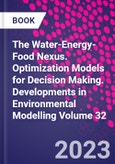The Water-Energy-Food Nexus: Optimization Models for Decision Making, Volume 32 covers water, energy, and food as crucial resources for human well-being and sustainable development. These resources are inextricably interrelated, therefore, to cover water, energy, and food demands in different sectors and at different scales, it must be considered several sources to produce resources, and the interlinkages of resources for a proper integration must be considered. This book emphasizes issues that must be considered in the design of water-energy-food nexus systems, such as the selection of technologies to produce water or energy, size of technologies, and food required for nutritional demands.
In addition, mathematical models are presented for the design of water-energy-food nexus systems involving several strategies to account for issues such as sustainable development, security of resources, interest in conflicts from stakeholders, and efficient allocation of resources.
Please Note: This is an On Demand product, delivery may take up to 11 working days after payment has been received.
Table of Contents
1. The water-energy-food nexus
2. Water-energy-food nexus security
3. Decision making and optimization models of the water-energy-food system
4. A Systematic Approach for Assessing the Water-Energy-Food Nexus for Sustainable Development
5. Involving the Water-Energy-Food Nexus in Integrating Low-Income Communities
6. Stochastic Optimization of the Water-Energy-Food Nexus in Disadvantaged Rural Communities
7. Sustainable Assessment of Water-Energy-Food Nexus Through a Multi-Stakeholder Optimization Approach
8. A water-energy-food security nexus framework based on optimal resource allocation








